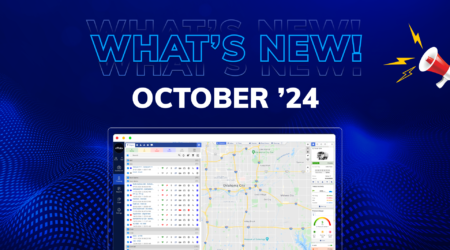Why Is Fleet Asset Tracking Important?
In the ever-evolving world of logistics and transportation, the need to stay ahead in managing fleet assets has never been more critical. GPS Fleet asset tracking stands out as a pivotal technology driving this sector’s transformation. It’s not just about knowing the location of your vehicles; it’s about harnessing data to optimize every aspect of their operation. This technology plays a crucial role in the seamless integration with advanced fleet management software, offering an unparalleled overview of your entire fleet at the touch of a button.
As we delve into the importance of fleet asset tracking, we’ll explore how this technology not only enhances operational efficiency but also propels businesses towards achieving their sustainability goals, improving safety standards, and delivering exceptional customer service. The integration of advanced fleet management software amplifies these benefits, providing a robust platform for data analysis, strategic planning, and real-time decision-making.
Fleet asset tracking is no longer a luxury but a necessity in today’s fast-paced, demand-driven market. It empowers fleet managers with the tools they need to make informed decisions, reduce costs, and improve overall fleet performance. With the right approach and technology, businesses can unlock the full potential of their fleet operations, setting new standards of excellence in the logistics and transportation industry.
Now, let’s take a closer look at why fleet asset tracking is so important and how it is shaping the future of fleet management.
What is Asset Tracking?
Asset tracking is a comprehensive process used by companies to monitor and manage their assets, including vehicles, equipment, and goods, throughout their lifecycle. This process involves the use of technology to collect real-time data on the location, status, and condition of assets, enabling businesses to maximize their utilization, enhance efficiency, and reduce costs. Asset tracking is a critical component of modern logistics, supply chain management, and fleet operations, offering a pathway to streamlined operations and strategic decision-making.
At its core, asset tracking utilizes a combination of Global Positioning System (GPS) technology, Internet of Things (IoT) devices, Radio Frequency Identification (RFID) tags, and software platforms to provide a detailed view of an asset’s journey. These technologies work together to offer insights into various aspects of asset management, including but not limited to:
Location Monitoring:
Knowing the exact location of vehicles and equipment at any given time, facilitating route optimization and quick response to unexpected situations.
Usage Analysis:
Understanding how assets are being used, identifying patterns or inefficiencies, and making informed decisions about deployment, maintenance, and procurement.
Maintenance Scheduling:
Proactively managing maintenance schedules based on real-time data, preventing downtime and extending the lifespan of assets.
Theft Prevention and Recovery:
Enhancing the security of assets through real-time alerts and geofencing capabilities, reducing the risk of theft and increasing the chances of recovery if an asset is stolen.
Regulatory Compliance:
Ensuring compliance with industry regulations and standards by maintaining accurate records of asset usage, maintenance, and emissions.
Asset tracking is not just about keeping tabs on physical assets; it’s about harnessing the power of data to drive operational excellence and strategic growth. By providing a transparent, real-time overview of asset performance and utilization, businesses can identify opportunities for optimization, reduce operational risks, and improve overall efficiency. Furthermore, asset tracking enables companies to deliver higher levels of customer service by ensuring the timely and reliable delivery of goods and services.
In essence, asset tracking is an indispensable tool in the modern business landscape, offering a wealth of benefits that span from operational efficiency and cost savings to improved safety and customer satisfaction. As technology continues to evolve, the possibilities for asset tracking and management will expand, further enhancing its value to businesses across various industries.
The Importance of Fleet Asset Tracking
Improved Asset Utilization
At the heart of fleet management is the optimization of asset utilization. GPS fleet asset tracking offers a clear lens through which businesses can view how each vehicle is used. By monitoring real-time data on vehicle location, usage patterns, and idle times, companies can significantly enhance the productivity of their assets. This visibility enables managers to make strategic decisions, such as reallocating resources to high-demand areas or scheduling maintenance during off-peak hours, ensuring that every vehicle is utilized to its fullest potential.
Enhanced Fleet Efficiency
Efficiency is the cornerstone of a successful fleet operation. GPS fleet asset tracking systems play a pivotal role in streamlining operations by providing detailed insights into route optimization, traffic conditions, and driver behavior. This data not only helps in reducing fuel consumption and wear and tear but also in minimizing idle times and improving delivery schedules. With precise tracking, fleets can achieve shorter delivery times and lower operational costs, making the entire process more efficient and cost-effective.
Increased Security and Safety
Security and safety are paramount in the transportation and logistics industry. GPS fleet asset tracking offers a proactive approach to managing these concerns. By enabling real-time tracking of vehicles, companies can quickly respond to theft, unauthorized use, or deviations from planned routes. Furthermore, the ability to monitor driver behavior helps in identifying risky practices, such as speeding or harsh braking, thereby promoting safer driving habits. This increased oversight not only protects assets but also ensures the well-being of drivers and the public.
Compliance and Reporting
Navigating the complex landscape of regulations can be a daunting task for fleet managers. GPS fleet asset tracking simplifies compliance by automating the collection and reporting of necessary data, such as hours of service, fuel usage, and maintenance records. This not only saves time and resources but also ensures accuracy and reliability in reporting, helping businesses stay on the right side of regulatory requirements. With automated reports at their fingertips, managers can easily demonstrate compliance and make informed decisions based on accurate data.
Key Benefits of GPS Fleet Asset Tracking
Cost Reduction
One of the most tangible benefits of GPS fleet asset tracking is the significant cost savings it offers. By optimizing routes, fleets can reduce fuel consumption and minimize idle times, leading to lower fuel costs. Additionally, better asset utilization and maintenance planning can extend the life of vehicles and reduce the need for costly repairs. Insurance companies often offer lower premiums for fleets with tracking systems, recognizing the reduced risk of theft and improved safety records. These savings collectively contribute to a healthier bottom line for businesses.
Data-Driven Decisions
In today’s data-driven world, having access to accurate and timely information is crucial for making strategic business decisions. Fleet asset tracking provides a wealth of data that can be analyzed to identify trends, predict maintenance needs, and optimize fleet operations. This information enables managers to make informed decisions that align with business objectives, such as scaling operations, enhancing customer service, or pursuing new market opportunities. With data at their fingertips, businesses can navigate the complexities of the fleet management landscape with confidence.
Customer Satisfaction
At the end of the day, the success of a logistics operation is measured by the satisfaction of its customers. Fleet asset tracking enhances customer service by ensuring timely deliveries and providing accurate, real-time information on shipment status. This transparency helps in building trust and reliability, key factors in maintaining long-term customer relationships. Furthermore, efficient fleet operations reduce the likelihood of delays and errors, further elevating the customer experience.
Environmental Benefits
Sustainability is increasingly becoming a priority for businesses and consumers alike. Fleet asset tracking contributes to environmental stewardship by optimizing routes and reducing unnecessary fuel consumption, thereby lowering the fleet’s carbon footprint. Improved vehicle maintenance and utilization also lead to fewer emissions, supporting efforts to combat climate change. By adopting fleet asset tracking, companies can not only improve their operational efficiency but also contribute to a more sustainable future.
Trends in Fleet Asset Tracking and Management Software
The landscape of fleet management is continuously evolving, with technological advancements playing a pivotal role in shaping its future. These innovations are not only enhancing the capabilities of fleet asset tracking but are also setting new benchmarks for efficiency, safety, and sustainability in the logistics and transportation industry. Let’s explore some of the key trends that are defining the future of fleet asset tracking and management software.
Integration of IoT and Telematics
The Internet of Things (IoT) and telematics have become cornerstone technologies in fleet asset tracking. By equipping vehicles with IoT sensors and devices, fleet managers can gather a wealth of data in real-time, from vehicle location to engine health and driving patterns. This integration allows for unprecedented visibility into fleet operations, enabling proactive maintenance, enhanced route planning, and improved driver safety. As these technologies continue to advance, their integration into fleet management software will become even more seamless, providing richer data insights and greater operational control.
AI and Machine Learning
Artificial Intelligence (AI) and Machine Learning (ML) are transforming how fleet data is analyzed and utilized. These technologies can sift through vast amounts of data to identify patterns, predict trends, and offer actionable insights. From predicting vehicle maintenance needs to optimizing delivery routes, AI and ML are making fleet operations smarter and more responsive. The incorporation of these technologies into fleet management software enables automated decision-making, reducing human error and enhancing overall efficiency.
Focus on Sustainability
Sustainability is a growing trend across all sectors, and fleet management is no exception. Fleet asset tracking and management software are increasingly incorporating features that promote eco-friendly practices. This includes route optimization to reduce fuel consumption, monitoring of driving behaviors to decrease emissions, and tools for managing electric and hybrid fleets. As businesses and consumers alike prioritize sustainability, the demand for green fleet solutions will continue to rise, driving further innovations in this space.
Enhanced User Experience
The user experience of fleet management software is undergoing significant improvements. Developers are focusing on creating more intuitive interfaces, simplifying the complexities of fleet tracking and management for end-users. This includes the development of mobile applications that provide fleet managers with the flexibility to monitor and manage their fleets from anywhere. Additionally, the integration of customizable dashboards and reporting tools allows for a more personalized and efficient user experience. As software becomes more user-friendly, it enables broader adoption and utilization, further driving the value of fleet asset tracking.
Connecting Fleet Asset Tracking to Our Advanced Fleet Management Software
Our advanced fleet management software stands at the forefront of these trends, offering a comprehensive solution that caters to the evolving needs of the logistics and transportation industry. By leveraging the latest technologies in IoT, AI, and sustainability, our software provides an unparalleled asset tracking experience that enhances operational efficiency, safety, and environmental responsibility.
Unique Features and Benefits
Our software differentiates itself through its integration of cutting-edge technologies and focus on user experience. Features such as real-time tracking, predictive maintenance alerts, and route optimization are designed to maximize fleet efficiency and reduce operational costs. Our commitment to sustainability is evident in our tools for monitoring and reducing emissions, supporting businesses in their green initiatives. Furthermore, our software’s intuitive interface and customizable dashboards ensure that fleet managers have easy access to the information they need to make informed decisions.
Real-World Applications and Success Stories
The impact of our advanced fleet management software is best illustrated through the successes of our clients. For instance, a logistics company was able to reduce its fuel costs by 20% within the first six months of implementation, thanks to our route optimization and driver behavior monitoring features. Another client, a national courier service, significantly improved its delivery times and customer satisfaction ratings by utilizing our real-time tracking and predictive maintenance tools. These real-world applications underscore the tangible benefits of our software, proving its effectiveness in enhancing fleet operations and contributing to business growth.
Conclusion
The importance of fleet asset tracking in today’s logistics and transportation industry cannot be overstated. Through enhanced efficiency, cost reduction, improved safety, and environmental sustainability, fleet asset tracking plays a critical role in the success of fleet operations. The integration of advanced technologies such as IoT, AI, and telematics into fleet management software is setting new standards for what is possible, driving the industry towards a more efficient, safe, and sustainable future.
Our advanced fleet management software is perfectly positioned to meet these evolving needs, offering a robust solution that leverages the latest trends and technologies. With our software, businesses can not only optimize their fleet operations but also align with their sustainability goals, improve safety standards, and deliver exceptional customer service. As we look to the future, it’s clear that the role of fleet asset tracking and management software will only continue to grow in importance, shaping the future of logistics and transportation for years to come.





